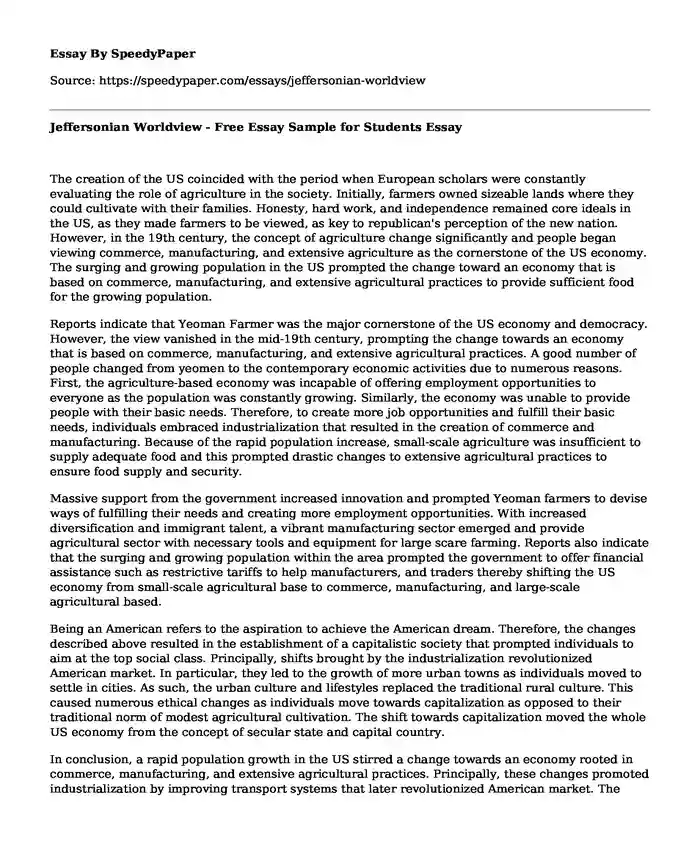
| Type of paper: | Essay |
| Categories: | United States Economics American dream |
| Pages: | 3 |
| Wordcount: | 704 words |
The creation of the US coincided with the period when European scholars were constantly evaluating the role of agriculture in the society. Initially, farmers owned sizeable lands where they could cultivate with their families. Honesty, hard work, and independence remained core ideals in the US, as they made farmers to be viewed, as key to republican's perception of the new nation. However, in the 19th century, the concept of agriculture change significantly and people began viewing commerce, manufacturing, and extensive agriculture as the cornerstone of the US economy. The surging and growing population in the US prompted the change toward an economy that is based on commerce, manufacturing, and extensive agricultural practices to provide sufficient food for the growing population.
Reports indicate that Yeoman Farmer was the major cornerstone of the US economy and democracy. However, the view vanished in the mid-19th century, prompting the change towards an economy that is based on commerce, manufacturing, and extensive agricultural practices. A good number of people changed from yeomen to the contemporary economic activities due to numerous reasons. First, the agriculture-based economy was incapable of offering employment opportunities to everyone as the population was constantly growing. Similarly, the economy was unable to provide people with their basic needs. Therefore, to create more job opportunities and fulfill their basic needs, individuals embraced industrialization that resulted in the creation of commerce and manufacturing. Because of the rapid population increase, small-scale agriculture was insufficient to supply adequate food and this prompted drastic changes to extensive agricultural practices to ensure food supply and security.
Massive support from the government increased innovation and prompted Yeoman farmers to devise ways of fulfilling their needs and creating more employment opportunities. With increased diversification and immigrant talent, a vibrant manufacturing sector emerged and provide agricultural sector with necessary tools and equipment for large scare farming. Reports also indicate that the surging and growing population within the area prompted the government to offer financial assistance such as restrictive tariffs to help manufacturers, and traders thereby shifting the US economy from small-scale agricultural base to commerce, manufacturing, and large-scale agricultural based.
Being an American refers to the aspiration to achieve the American dream. Therefore, the changes described above resulted in the establishment of a capitalistic society that prompted individuals to aim at the top social class. Principally, shifts brought by the industrialization revolutionized American market. In particular, they led to the growth of more urban towns as individuals moved to settle in cities. As such, the urban culture and lifestyles replaced the traditional rural culture. This caused numerous ethical changes as individuals move towards capitalization as opposed to their traditional norm of modest agricultural cultivation. The shift towards capitalization moved the whole US economy from the concept of secular state and capital country.
In conclusion, a rapid population growth in the US stirred a change towards an economy rooted in commerce, manufacturing, and extensive agricultural practices. Principally, these changes promoted industrialization by improving transport systems that later revolutionized American market. The changes also had ethical and social effects. In particular, they prompted the growth of more urban towns since many people migrated to cities. The migration of people from rural areas to urban areas made the urban culture and lifestyles to replace traditional rural culture. This made people move towards capitalization as opposed to the traditional cultivation. The shift towards capitalization moved the whole US economy from the concept of secular state and capital country.
Bibliography
Banning, Lance. "Jeffersonian Ideology Revisited: Liberal and Classical Ideas in the New American Republic." The William and Mary Quarterly 43, no. 1 (1986), 3.
Jefferson, Mark, and F. H. King. "Farmers of Forty Centuries." Bulletin of the American Geographical Society 44, no. 5 (1912), 360.
Li, Huan, Xianjin Huang, Mei-Po Kwan, Helen X. Bao, and Steven Jefferson. "Changes in farmers' welfare from land requisition in the process of rapid urbanization." Land Use Policy 42, no. 30 (2015), 635-641.
Price, Richard. "A universal merchant to the world: the political economy of commerce and finance." British Society, 1680-1880 1, no. 3 (2008), 52-87.
Ratzlaff, Robert K., and James B. Schick. "The Early American Republic Revisited: Textbook Perceptions of American History, 1789-1848." Journal of the Early Republic 1, no. 2 (1981), 107.
Sturges, Mark. "Founding Farmers: Jefferson, Washington, and the Rhetoric of Agricultural Reform." Early American Literature 50, no. 3 (2015), 681-709.
Cite this page
Jeffersonian Worldview - Free Essay Sample for Students. (2022, May 30). Retrieved from https://speedypaper.net/essays/jeffersonian-worldview
Request Removal
If you are the original author of this essay and no longer wish to have it published on the SpeedyPaper website, please click below to request its removal:
- Essay Sample: The Potential Use of Archival Research in Dissertation Writing
- Patient-Centered Medical Home, Free Essay
- Free Essay on Protecting Personal Information (PPI)
- Free Essay about Information Sharing in Teams
- Childhood Development Essay Example
- Free Essay Example: Public Shopping Mall
- Free Essay. Importance of Understanding Clients Within the Context of Their Cultures
Popular categories




